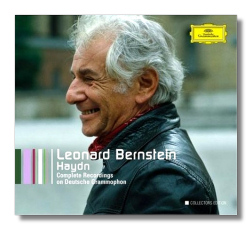
The Internet's Premier Classical Music Source
Related Links
- F.J. Haydn Reviews
- Latest Reviews
- More Reviews
-
By Composer
-
Collections
DVD & Blu-ray
Books
Concert Reviews
Articles/Interviews
Software
Audio
Search Amazon
Recommended Links
Site News
 CD Review
CD Review
Franz Joseph Haydn

The Complete Bernstein-Haydn Recordings on Deutsche Grammophon
- Missa in tempore belli *
- Die Schöpfung *
- Symphony #88 in G Major
- Symphony #92 "Oxford" in G Major
- Symphony #94 "Surprise" in G Major
- Sinfonia concertante in B Flat Major, Hob I:105
Judith Blegen, Lucia Popp, sopranos
Brigitte Fassbaender, mezzo-soprano
Claes H. Ahnsjö, Thomas Moser, tenors
Kurt Ollmann, Hans Sotin, basses
* Bavarian Radio Symphony and Choir/Leonard Bernstein
Vienna Philharmonic Orchestra/Leonard Bernstein
Deutsche Grammophon 474919-2 DDD 4CDs: 77:39, 66:43, 60:19, 56:29
Here, in a convenient and inexpensive "Collectors Edition" box, are all the Haydn recordings that Leonard Bernstein made for Deutsche Grammophon. Earlier in his career, he recorded quite a bit of Haydn for Columbia (now Sony Classical), but those recordings are becoming a little more difficult to find, so the present release is doubly welcome.
Bernstein was unabashed about using a full-sized orchestra in this repertoire. At least in the non-vocal works, Haydn probably would have been surprised (but not necessarily displeased) by these "big band" performances. Musicologists immersed in 18th-century performance practice might look askance, but Bernstein really was a product of his times. By the time the authenticists started throwing their weight around, it was too late to convince most conductors from Bernstein's generation to pare down their performances of music from the Classical era. And, to be honest, authenticity and validity are similar but not identical concepts anyway. Bernstein, Solti, Beecham, and others made Haydn speak to one audience as surely as Harnoncourt, Brüggen, and Kuijken made him speak to another one.
Bernstein's earlier recordings were more spontaneous and joyful than these remakes, which date from 1983 (Symphony #88) to 1986 (Die Schöpfung). The New York Philharmonic tended to sound more brilliant than the darker-toned, more "massy" orchestras in Vienna and Munich. One must take into account, however, the brasher sound that was favored by Columbia's engineers. What the newer recordings lack in spontaneity and fun, they gain in strength. Indeed, the appearance of the Sun in Die Schöpfung will have you running for sunglasses if it doesn't knock you down! As demonstrations of sonority per se, these later recordings are superior. The populist of the 1950s and 60s had transformed himself into an Old Master by the 1980s. I can't imagine anyone sympathetic to more old-fashioned performances of Haydn's music not being satisfied with Bernstein's dignified and humane interpretations, despite their occasional heaviness.
The four discs come in paper envelopes housed in a hard paper box. There is a booklet which contains a long, fawning note by Bernard Jacobson, but no texts or translations, unfortunately. At the price, though, this set still is worth serious consideration.
Copyright © 2004, Raymond Tuttle


















